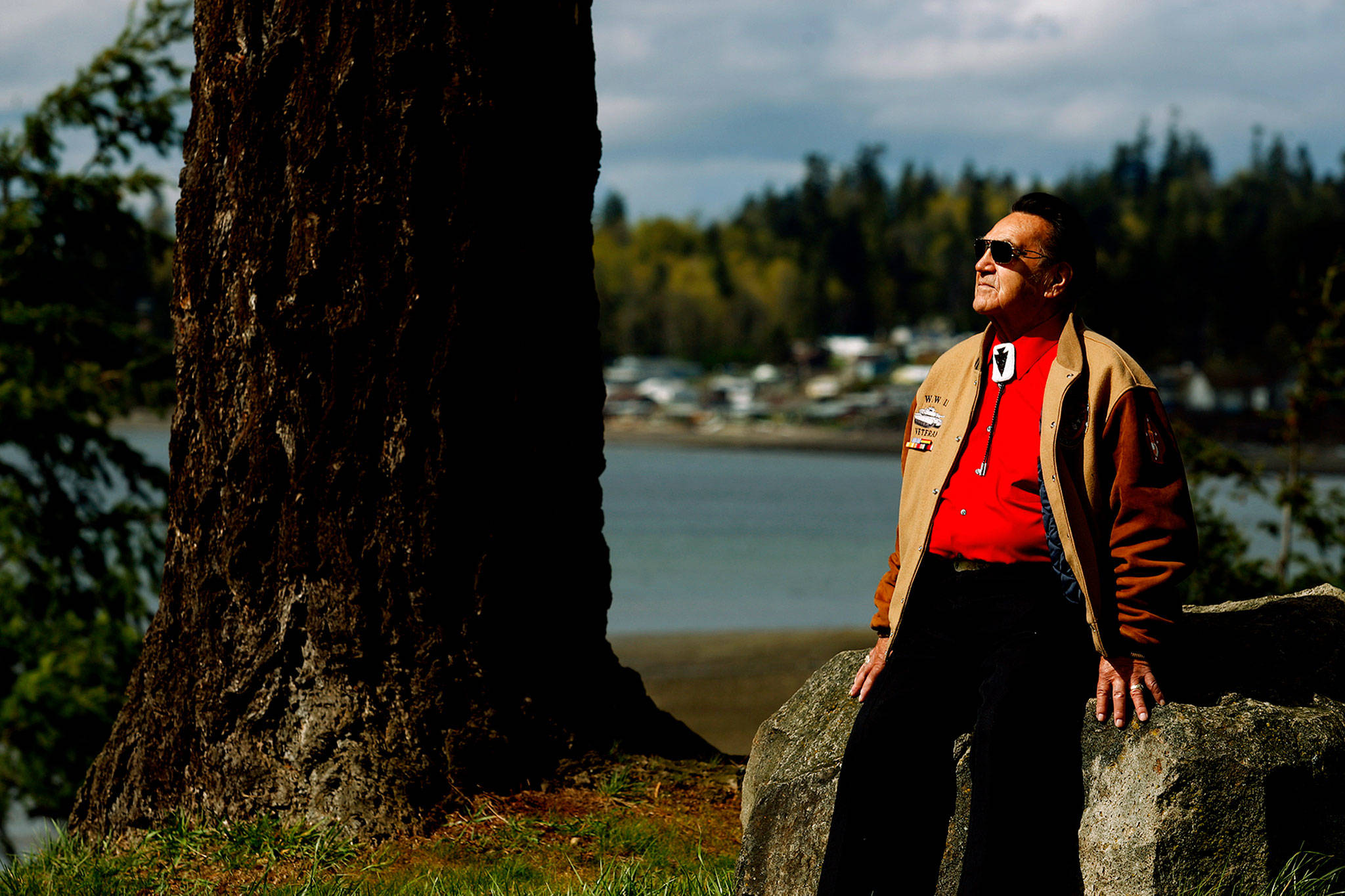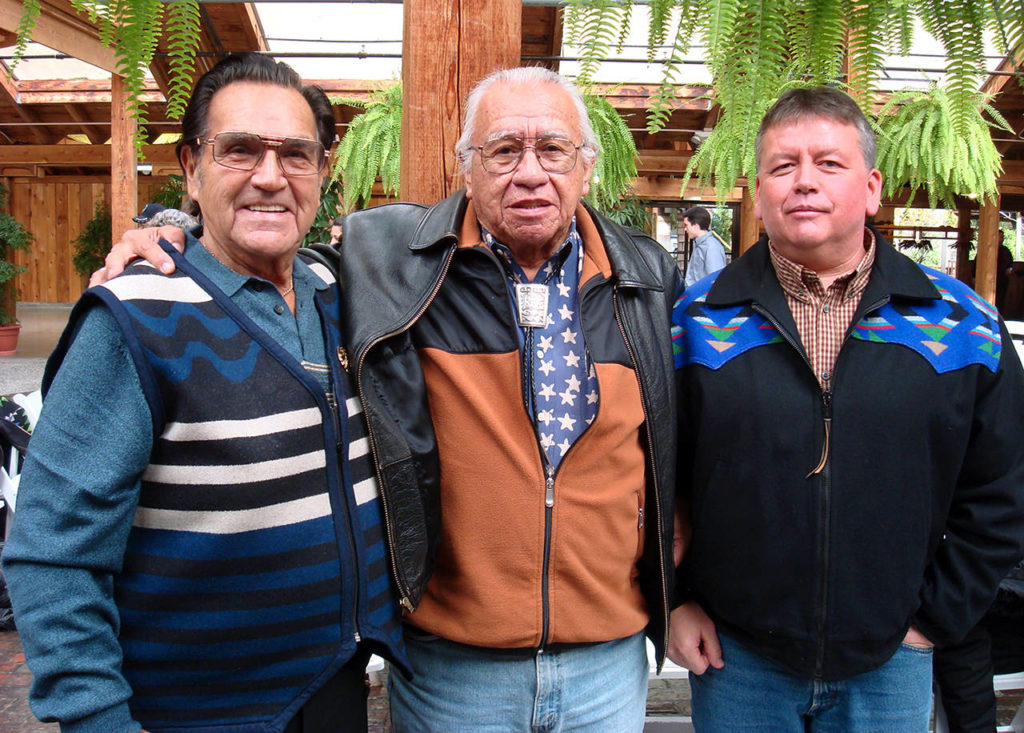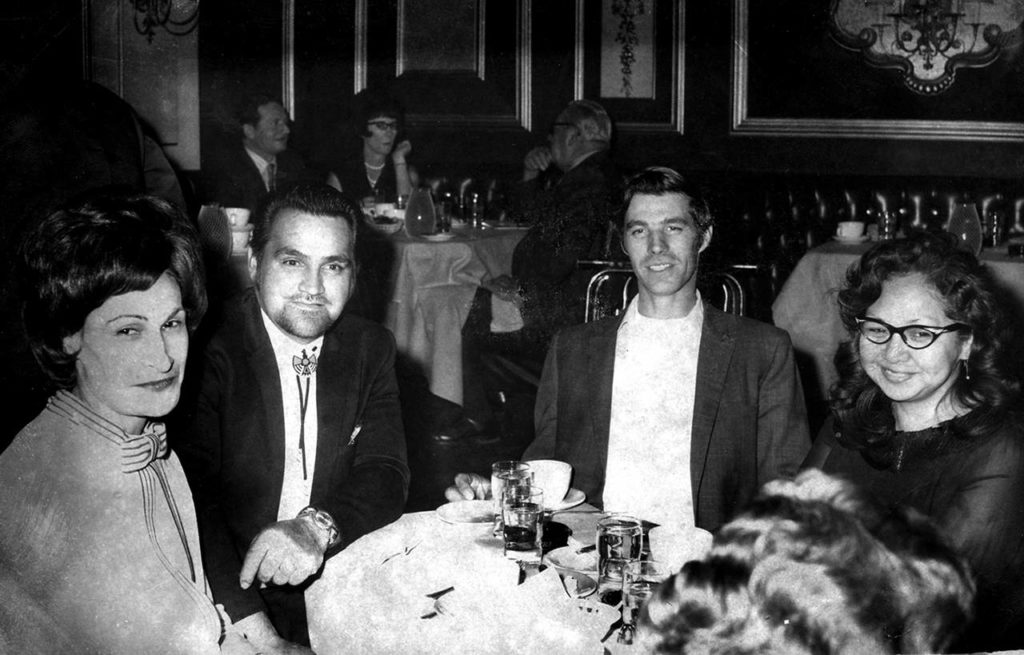TULALIP — Stan Jones, an engaging and hardworking leader who bridged cultures and generations while turning the Tulalip Tribes into one of the region’s economic juggernauts, has died.
His was a remarkable life. He fought for his country and for tribal treaty rights. He aided in efforts to restore lost customs and reassert culture. He saw the tribal payroll increase from three to today’s 3,500 employees. He met presidents Bill Clinton and George W. Bush, dined at Bill Gates’ home, served on a bank board of directors for 16 years, and once negotiated with a New York billionaire businessman named Donald Trump.
Stanley Gale Jones Sr., 93, died Tuesday morning with family by his side.
No one served longer on the tribal board of directors. During those 44 years, he was tribal chairman for 26. In 15 board elections, Jones never lost. Today, his daughter Teri Gobin is chairwoman of the tribal board, and she’s thankful for the example her father set.
“He opened a lot of doors to our tribes,” Gobin said.
It was important for Jones to know that tribal members, particularly children, received the help they needed. In the week before he died, he’d often ask his granddaughter Teresa Jira if members of the tribes had enough food, good shoes and decent homes. She reassured him that they did, which brought him great comfort, Gobin said.
He knew all too well what it was like to do without.
Long before he was a tribal leader, Jones was a Depression-era child in leaky government-issued shoes who’d sift worms from sacks of flour his family picked up at the reservation commissary. Born July 10, 1926, in Monroe, the son of Juanita Giddings and George Culver Jones lost his mother when he was 3. By the age of 9, he was sent to a Tacoma hospital for Indian children with tuberculosis. He spent three years on bed rest and being spoon-fed cod liver oil. One of his brothers died at the same hospital during that time.
Jones quit school after eighth grade to work in the woods, but he never stopped reading, learning and taking notes.
At 17, he enlisted in the U.S. Marine Corps. During World War II, he served in the 2nd Tank Battalion, 2nd Marine Division in the Pacific. In Saipan, he was the only minority in his unit and was assigned his own tent when others had up to four people in one.
He was deeply affected by what he saw during nine months of occupation in Nagasaki after the United States dropped an atomic bomb. He remembered how grateful the refugees were for food scraps and simple acts of compassion, and he would smuggle leftovers from officers’ quarters to homeless Japanese children.
Over the years, Jones spent time in logging camps, shoveled coal from boxcars, drove fuel and log trucks, worked as an electrician and hauled in salmon from his fishing nets.
He wed Seattle resident JoAnn Barrie in 1950. They were married for nearly 70 years and she and Gobin were by his side when he passed.
By 1966, Jones was recruited to run for the tribal board by Harriette Shelton Dover, an elder who worked tirelessly to keep Indian traditions alive. She was on the board and was its first chairwoman.
A few years later, Jones was in the middle of the landmark federal court battle that came to be known as the Boldt Decision, which restored treaty fishing rights.
Glen Gobin, vice chairman of today’s tribal board, was barely of driving age when he would tag along with his dad, Bernie Gobin, and Jones as they would meet with other tribal and state government leaders to discuss treaty rights issues. Their knowledge, testimony and negotiating savvy in the 1970s proved important in the tribal case. The verdict awarded several tribes half the salmon in their “usual and accustomed fishing grounds”
“He was a man who literally came from nothing, from Native American heritage which often put you at a disadvantage,” Glen Gobin said. “For him to pull himself up and keep going and strive to build tribal government up to what it is today, it is really hard to comprehend. He had the strength to continue on. He was one of the strongest men I ever knew, not just physically but mentally.”
He also had a head for business, Glen Gobin said.
“He was an entrepreneur who was a success at everything he did, and he brought those skills to the table at Tulalip,” he said.
Jones often spent eight-hour days on tribal business followed by two or three hours readying his fishing boat at the Tulalip Marina. When he’d get home he’d read documents and contracts often past midnight, wanting every bit of knowledge he could absorb.
“He was a tribal leader for everybody,” said Don Hatch, 80, who spent more than 29 years on the tribal board. “That was the good part of Stan.”
Dover approached Jones and a few other tribal members in 1976 when she wanted to revive the ancient First Salmon Ceremony federal officials had outlawed in the early 1900s. Dover recited the Indian words and songs that Jones wrote down phonetically in English the best he could. The ceremony to honor the first salmon runs each spring began with a small gathering. It is much larger now.
Jones often was the first to help stranded fishermen in distress in any weather conditions, be they in need of gas, had a dead battery or engine trouble, Hatch said.
His profile grew nationally in the 1980s and 1990s. He was appointed chairman of the newly formed National Indian Gaming Task Force in 1982. A few years later, the Tulalip Tribes signed the first compact with the state allowing for gambling on the reservation.
Ernie Stevens Jr., a member of the Oneida Nation of Wisconsin, was an understudy to Jones in those days. Jones later nominated Stevens to become chairman of what’s now the 184-tribe National Indian Gaming Association in Washington, D.C.
“The foresight of those leaders like Stan Jones brought us to where we are today,” Stevens said.
In Jones, Stevens saw a pioneer in gaming and a classic leader in the sense that he was curious and soft-spoken, but could be stern when the situation called for it. His Indian name was “Scho-Hallem,” meaning No. 1 Warrior.
“Stan was a gentleman who worked hard in everything he did in a principled way, morning, noon and night, and was the first one to arrive and the last one to leave,” Stevens said. “He always wanted people to help people. That’s what he taught me.”
Stevens plans to attend funeral services for his mentor next week.
“To us, he is like losing a congressman, a senator or a president,” Stevens said.
And to some folks Jones had the aura of another high-profile figure. Jones was an Elvis Presley look-alike. He was often stopped and asked if he’d mind having his photo taken because of the likeness. He was happy to oblige, sometimes with a “Thank you very much.”
“He found great joy in that,” Glen Gobin said.
Services are being planned for Monday afternoon and evening at the Tulalip Casino Resort’s Orca Ballroom and continuing Tuesday morning.
Eric Stevick: 425-339-3446; stevick@heraldnet.com.
Talk to us
> Give us your news tips.
> Send us a letter to the editor.
> More Herald contact information.




























